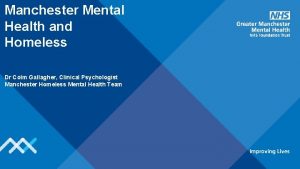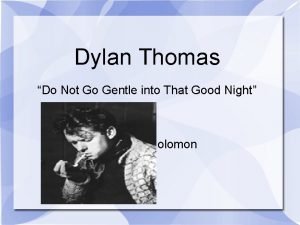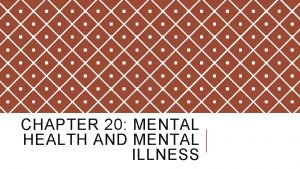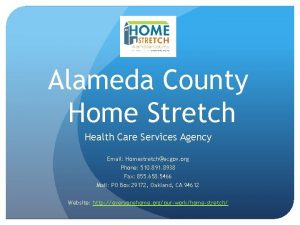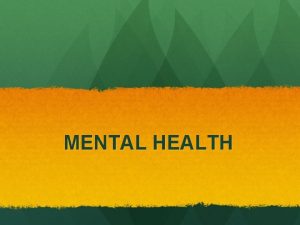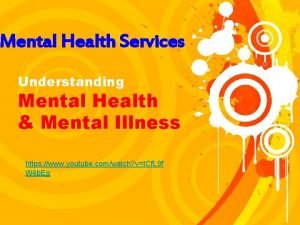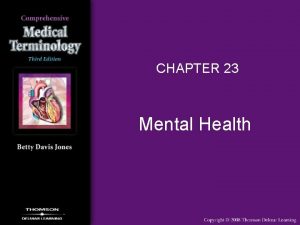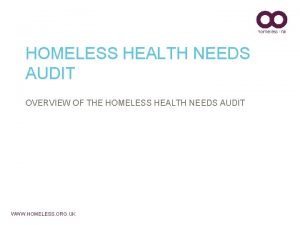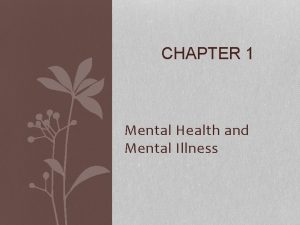Manchester Mental Health and Homeless Dr Colm Gallagher














- Slides: 14

Manchester Mental Health and Homeless Dr Colm Gallagher, Clinical Psychologist Manchester Homeless Mental Health Team

Mental health / homelessness overview 45% homeless individuals have been diagnosed with a mental ‘illness’ 80% report some form of mental health issue (Homeless Link, 2014) Strong and consistent evidence of association between complex trauma and homelessness (prior/during homelessness) Relationship between traumatic experiences and the individuals mental health. Cockersell, (2018)

Psychiatric Diagnosis rates homeless compared to general population ‘Schizophrenia’ 16 -30 per cent (1 -4%) ‘Personality disorder’ 50 -70 per cent (5 -13%) Anxiety disorder and depression 50 -80 per cent (11%) Attempted suicide 42% (1. 3%) Cockersell, 2011 Depression and anxiety are more prevalent amongst homeless population – complicated by often underdiagnosed problems Drug and/or alcohol is a common complication for the emotional wellbeing of individuals

Higher prevalence amongst homeless population • ADHD (Murillo et al. , 2016) • Chronic Pain (Groundswell, 2018) • Autism Spectrum Disorder (Churchard et al. , 2018) • Learning disability (Oakes & Davies, 2008) • Brain Injury (see Neuro. Triage presentation)

Urban Village Medical Practice: Homelessness and Mental Health • Widely recognised that mental health problems are both a cause and consequence of homelessness. • 157 homeless patients diagnosed with Severe and Enduring Mental Illness which is 18% of the registered homeless population. • 683 homeless patients diagnosed with “mild to moderate mental health problem”, 77% of the registered homeless population. • 49 patients seen by Homeless Mental Health Team between May 2017 May 2018.

Maslow Hierarchy of needs • None of these needs — starting with basic survival on up — are possible without social connection and collaboration. • Connection is a prerequisite for survival both physically and emotionally. ” • Needs are not a hierarchy. Life is messier than that.

Manchester Mental Health and Homeless Organisational Group


MHHOG - Aims To improve mental health treatment and support for homeless people across Manchester. To identify opportunities, develop clinical pathways, and make improvements to service delivery To work with Housing Providers to support people’s mental health needs in temporary and homeless accommodation.

Organisations involved GMMH Booth Centre Urban Village Inspiring Change Manchester Riverside Manchester City Council Turning Point Men’s Room Self Help services Mustard Tree MFT (NHS) Big Life Cornerstones CGL Barnabus On the out

Developments Training • Dual diagnosis • Psychological perspectives • Mental Health Champion Pilot projects • IAPT pilot at The Booth Centre • Greater Manchester Psychological Informed Environment s

Developments • Re-development of Manchester Homeless Mental Health Team • 2 new ‘street’ mental health workers (outreach and drop-in) • Development of inpatient discharge process • • Beechmont – step down accommodation CMHT homeless pathway development Much more to do

Recommendations • City wide PIE? • Trauma informed Housing First model? • Dedicated neuropsychological assessment and support service? Urban Village recommend • Better access to therapeutic interventions for homeless patients with “mild to moderate mental health problems” • Assertive response to growing population with complex health issues – particularly rough sleeping population • More flexible access to Psychiatrist for complex homeless patients

Manchester Peer Worker Network Development Lee Fletcher Booth Centre
 Colm gallagher
Colm gallagher Manchester and differential manchester
Manchester and differential manchester Colm garan hart thomas
Colm garan hart thomas Chapter 20 mental health and mental illness
Chapter 20 mental health and mental illness Mental health coping skills jeopardy
Mental health coping skills jeopardy Home stretch alameda county
Home stretch alameda county Greater manchester health and social care partnership
Greater manchester health and social care partnership Why doesnt holden throw the snowball
Why doesnt holden throw the snowball Kelly gallagher write like this
Kelly gallagher write like this Lola gallagher
Lola gallagher Niall horan maura gallagher
Niall horan maura gallagher Kelley gallagher
Kelley gallagher Catcher in the rye target
Catcher in the rye target Kelly gallagher sentence of the week
Kelly gallagher sentence of the week Gallagher law library
Gallagher law library
